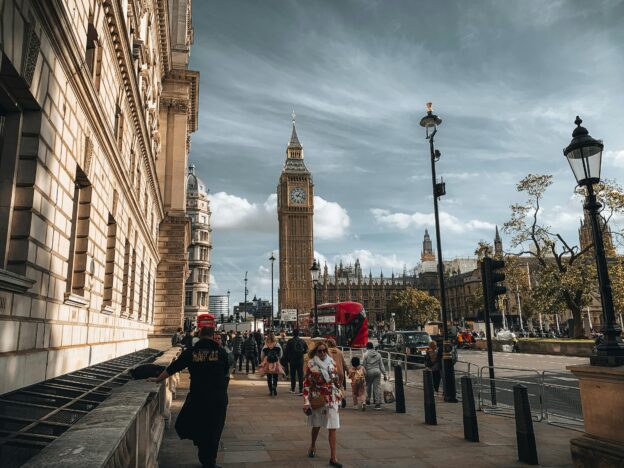The highs and lows of the first parliamentary year
In its first year since winning the 2024 general election, Starmer’s government has shown intent to implement its manifesto pledges, but whether this has translated into successful policy delivery remains a subject of debate. Ministers have pursued ambitious reforms in areas like trade, education, health, and energy, but they have also faced political turbulence and criticism over policy missteps, particularly around tax, grooming gangs and welfare reform.
Crucially, the government seems to be unable to unlock that elusive growth on which so much of its spending plans depend. Much of Labour’s policy programme is still in its early stages, with a strong emphasis on structural reform in Whitehall and long-term planning which should be commended. However, this emphasis leaves the government with few immediate wins to show the public and, with key reforms still light on detail and outcomes, questions are already mounting about the government’s effectiveness.
On the international stage, however, the Prime Minister has emerged as a confident statesman. His handling of the Trump presidency, securing of trade deals with the US, EU and India, and continuation of the UK’s support for Ukraine have won praise both at home and abroad. This has helped to re-establish Britain’s role as a serious global actor – although notably absent of any meaningful involvement from foreign secretary David Lammy.
Domestically, there has been modest progress on housing and NHS waiting times, but delivery has been hampered by fiscal constraints. But domestic policy also reveals some of the sharpest criticism. The removal of the Winter Fuel Payment from millions of pensioners, presented as a necessary fiscal decision, sparked major backlash and a messy U-turn. The electorate does not expect these sorts of economic decisions from a Labour government, which has resulted in widespread reputational damage from a policy that seems to contradict Labour’s core identity. The increase in employer National Insurance contributions (NICs) has also been poorly received, with concerns over its impact on jobs and wages. On immigration, growing public unease and the government’s mixed messaging has opened space for Nigel Farage’s Reform UK to gain traction and control the narrative.
Overall, the government has had a mixed first year. There was no political honeymoon, with downbeat messaging on the economy, the early ‘freebies scandal’ and unpopular welfare cuts undermining any prospect of ministers picking up some early momentum. Coupled with a challenging economic backdrop, rising support for Reform UK and the geopolitical volatility exacerbated by Trump’s return to power, the need for a recalibration of political and policy strategy is becoming clear. The government’s commitment to its manifesto is not in doubt, but turning that commitment into visible, meaningful results is the test that now lies ahead.
Labour and the business & investor community: a genuine partnership for growth?
Courting investors and businesses was a key part of Labour’s pre-election pitch. The Prime Minister and Chancellor were keen to demonstrate the party’s credibility on the economy and support investment into the UK as part of its wider growth ‘mission’. However, in government, Rachel Reeves used her first fiscal event – the 2024 autumn budget – to increase employer NICs by 1.2%, representing a £25 billion tax hike on businesses. This came alongside increases to Capital Gains Tax and the National Living Wage. The latter measure has been particularly costly for businesses with a large proportion of low paid workers on their payroll.
While the government argued this was necessary to address the fiscal ‘black hole’ it inherited from the outgoing Conservatives and to boost support for low-paid workers, it has done little to inspire confidence in the business and investment community. Indeed, GK Strategic Advisers and former ministers David Laws and Rob Halfon both warn that the employer NICs rise has been particularly damaging to the government. This is despite early positive decisions on infrastructure and commitments to speed up planning processes. Since last year’s budget, ministers have been playing catch up in their efforts to restore confidence amongst businesses and stimulate private investment at a time when geopolitical uncertainty is threatening to wreak havoc on the global economy.
President Trump’s ‘Liberation Day’ announcement on 2 April, which saw his administration unveil sweeping global tariffs, was a watershed moment and one which Starmer deftly navigated. The US-UK Economic Prosperity Deal sees the UK sidestep many of the Trump’s tariffs and, amongst other provisions, allows UK car manufacturers to sell vehicles to the US at a 10% tariff rate and cuts tariffs on UK aerospace exports to zero.
Despite Starmer’s success on the international stage, challenges lie ahead for the government in its relationship with businesses and investors. The Employment Rights Bill is due to complete its passage through Parliament in the autumn. The legislation introduces a new package of workers’ rights, including day one employment rights, ending the use of certain zero hours contracts and improving access to flexible working arrangements. Many of the measures contained in the bill will be subject to further consultation with businesses over the coming months. It is vital that the government gets the eventual implementation of these reforms right to avoid any further damage to its relationship with the business and investment community.
As parliament rises for summer recess and we take stock of the government’s first full parliamentary year, it is fair to say that the public-private partnership for growth that Labour first envisaged when it came to power has not yet materialised. As put by GK Strategic Adviser and former Health Minister Steve Brine: “The growth mission, which sits at heart of the government’s plan to get re-elected, has been hampered by uncertainty from the shifting taxation landscape and the many reviews and consultations that are yet to translate into firm policy direction.”
Starmer will need to translate the success he has found on the international stage to his domestic agenda if he hopes to bring businesses and investors back on side and enable them to deliver the economic growth upon which so much of his government’s policy agenda relies.
The ‘ones to watch’
Westminster has been speculating for several months as to whether the Prime Minister will instigate a cabinet reshuffle before the end of 2025. Though it may seem like a distant prospect, many are already keeping an eye on some Labour MPs who could be next in line for promotion.
Peter Kyle MP: With experience as a former Special Adviser in the last Labour government, Kyle is a slightly more seasoned voice in the Labour ranks than other rising stars. Described by Steve Brine as “hugely gifted”, the Science and Tech Secretary has consistently impressed, particularly in his initiative to coordinate a unified cross-government approach to data, digital and AI, and as a talented and dependable ‘Minister for the Morning Round’.
Torsten Bell MP: Formerly the chief executive of the Resolution Foundation and a Labour party aide during the 2008 financial crisis, Bell knows the ins and outs of policy, economics and politics. Though a fresh-faced Labour MP, part of the 2024 intake, he is already holding ministerial positions across both HM Treasury and the Department for Work and Pensions, and is expected to continue to rise through the ranks.
Miatta Fahnbulleh MP: Taking over the seat Harriet Harman represented since 1982 was no small feat, but Fahnbulleh has not disappointed. Like Bell, Fahnbulleh was elected in July 2024 and was immediately appointed to a junior ministerial role. A former Cabinet Office official and CEO of the New Economics Foundation, her experience has made her a capable MP and minister. Her reputation for going above and beyond has not gone unnoticed, with David Laws remarking she is “a bright junior minister who has already impressed her colleagues”.
Josh MacAlister MP: Otherwise known as education and social care’s ‘golden child’, MacAlister entered parliament with a reputation that precedes him. MacAlister was chosen by the Conservative government to conduct an eponymous review of children’s social care in 2021. Now serving as the parliamentary private secretary to Pat McFadden – one of the government’s most instrumental figures – MacAllister has been carefully watching the recommendations of his review being implemented through the Children’s Wellbeing and Schools Bill. He is certainly proving himself to be successful campaigner and capable MP.
The next 12 months, and beyond…
For David Laws, the priority for the next 12 months is “growth”. The Chancellor faces the daunting task of stabilising the public finances while avoiding tax rises in the autumn. However, recent briefings suggest that tax rises, particularly on higher earners, seem inevitable unless economic performance improves. Her Mansion House Speech set out Reeves’ plans to unlock growth in the financial services sector, while trade deals struck signal an important first step towards a more outward-facing agenda. A more pragmatic approach to Europe, while politically fraught, remains a low-cost, pro-business lever available to the government to recover some of the growth lost post-Brexit.
Another priority is the ‘retail offer’ that helped Labour win in 2024: NHS reform. Steve Brine argues that meeting the 18-week waiting time target for NHS elective care would be seen as a real mark of success. Elsewhere, there are the structural reforms underway for planning and devolution that were fundamental to the “decade of national renewal” promised during the election campaign. Deputy Prime Minister Angela Rayner, empowered and ambitious within the government, is quietly progressing with this agenda with little sign of slowing down.
David Laws suspects that we will also see those more talented ministers begin to demonstrate progress in exciting vanguard sectors like technology, AI and clean energy: areas which are vital to enhancing the UK’s economic position.
Measurement of success in May
The real test of success will be the elections in major cities and, significantly, in the Welsh and Scottish parliaments in May 2026. While midterm elections are often tricky for incumbent governments, Labour would not have been expecting to weather such dissatisfaction so soon, and a poor performance at the May 2025 local elections was an early warning sign of this.
The traditional dividing lines of left and right, class and geography, are no longer accurate measures of voter sentiment. Rather, the electorate is split into groups defined less by ideology, and more by attitudes to institutions, cultural, social and economic issues. Steve Brine emphasises that support for the two main parties has always been fluid. However, in 2024, Labour and Conservatives collectively won just 54% of the vote – a post-war low. Recent polling showing double digit support for smaller parties like the Greens suggests fertile ground for insurgent parties that are attracting support from new parts of the electorate that they wouldn’t normally have.
Technocrats vs. Populism
GK Strategic Adviser and former Care Minister Phil Hope warns that the rise in populism is the “biggest threat to our democratic institutions”. For No.10, the immediate concern is Reform UK. The Prime Minister’s Chief of Staff, Morgan McSweeney – who is often characterised as the architect of Starmer’s premiership – believes that right-wing populism must be defeated by showcasing competent government. In practical terms, this means delivering real improvements to the way people interact with public services, and being tougher on immigration, to reassure disenfranchised, Reform-leaning voters that their economic and cultural concerns are being addressed.
While Reform grabs the headlines, Labour also faces mounting dissent from the left. Disillusioned, younger voters are drifting towards alternatives that they believe are more convincing and radical on climate, equality and security issues. While 6% of Labour’s 2024 voters have moved to Reform, three times as many have shifted to parties of the left. Recent polling gains for the Green Party and a new party led by Jeremy Corbyn underscore this trend. It is worth remembering that Corbyn secured 40% of the vote in 2017 compared to Starmer’s just 33.7% in 2024. For a Labour leadership that has worked hard to marginalise the hard left, this insurgent left-wing movement could expose vulnerabilities in Labour’s emerging strategy of wooing Reform voters on issues such as immigration and the so-called ‘culture wars’.
Clowns to the left of me, jokers to the right
Labour now finds itself squeezed on both its political flanks, while struggling to articulate a unifying strategy for the broad, fragile coalition it assembled in 2024. Without a coherent narrative, it risks alienating voters whose priorities and values increasingly diverge.
In political terms, there is still a long way to go until the next election. But in the absence of a compelling narrative or delivery on issues such as immigration, Downing Street faces a difficult task to work out who its voter base is and what it wants. As GK’s strategic advisers all note, an economic upturn would relieve much of this pressure. But with that unlikely in the next 12 months, the consequences will be felt at the ballot box in May 2026 – where Labour’s already narrow share of the vote could be eroded further.
Scott Dodsworth // Senior Partner & Managing Director // scott@gkstrategy.com





